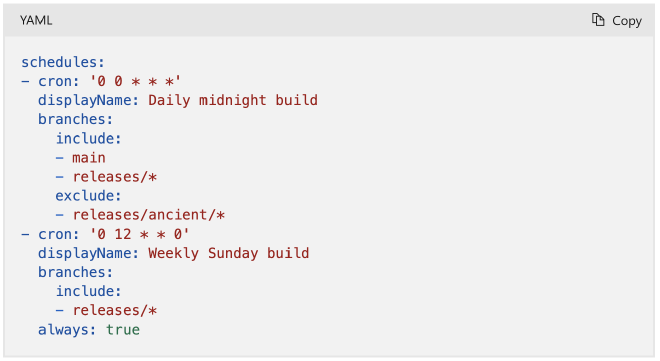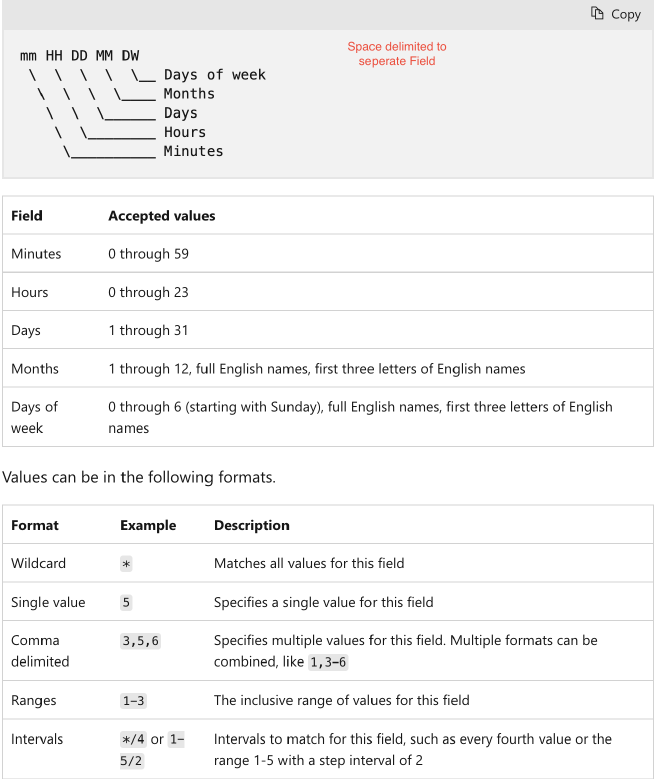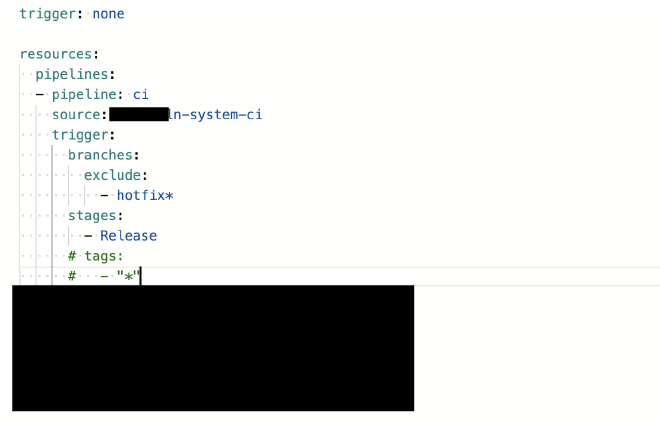Required Knowledge#
- Basic Linux Command
- Build Tool for each Programming Language (dotnet,Node,Python,Go,JAVA)
- YAML (Learning in 10 minute click)
- Optional
- Basic Python (Accees file and io)
- Docker
AzurePipeline#
I focus on YAML Pipeline
There are 2 type
- Classic pipeline (GUI)
- Build (as CI. currently it is disappear from azure devop menu)
- Release (as CD )
- YAML Pipeline (if can be both CI/CD in one file or seperate file. it depends on your workflow)
Pipeline Component#

- Stage
- Job and Agent (MS Host and SelfHost)
- Job type
- Deployment (auto download pipeline Artifact)
- Job
- Job type
- Step
- task
- script
Trigger and Resource#
Type of Trigger
- CI Trigger
- PR Trigger
- Schedule Trigger
- Pipeline Completion Trigger (Trigger from another pipeline)
CI Trigger#
is trigger from version control


PR Trigger#
is trigger from version control like CI trigger but it focus on event pull request instead push.

Schedule Trigger#
you can config by both GUI and YAML. More detail



Pipeline Completion Trigger#
this trigger type for triggering from one pipeline to other pipeline. it is very useful when you want to seperate cd pipeline file from ci.

- Tigger:none is mean disable any trigger from version control
- pipeline: ci is alias name that can be used to referance in this pipeline file.
- source: funny-sln-system-ci is name of origin pipeline that can run success.
Resources that can trigger pipeline#
including
- pipeline
- repository ( github,azure repo)
- container ( dockerhub,acr)
- package (npm,nuget from AzureArtifact)
- webhook (by httpClient calling like fetch or axios) more detail
Varibales#
Catagory (informally)#
- Pipeline Variable Environent is any variable that define in root,global,stage,job scope like below.
jobs:
- job: build
variables:
- foo: bar
steps:
- bash: |
echo $(foo) # This will be bar
echo '##vso[task.setvariable variable=foo]baz'
echo $(foo) # This will also be bar, $(foo) expands before the step
echo $[foo] # This will be baz, $[foo] expands during the step
- bash: echo $(foo) # This will be baz. The variable is expanded just before the step
- Task or Script Variable Environment is variable that define within script or task like below
# Sets FOO to be "some value" in the script and the next ones
- bash: |
# this is task variable
FOO1="runtime value"
#this is a way to declare pipeline variable enviroment in script
echo "##vso[task.setvariable variable=FOO]$FOO1"
# Using the $() syntax during "compile time", the pipeline expands the variable
- bash: |
# to reference pipeline environment variable that use logging command synctax to set.
echo "$(FOO)"
# this task environment variable
echo "$FOO1"
env:
FOO1:$(FOO)
# Using an environment variable in the script context at "runtime", bash expands the variable
- bash: |
# this is task environment variable (task env will be applied from pipeline variable in parent level automatically )
echo "$FOO"
Data Type#
- String
- Number
- Boolean
- Object
- Array
Scope#
precedence variable scope (sort by ascending)
- Root (in UI Console)
- Global (In Yaml)
- Stage
- Job
- Step
- A step includig
- Step Type => Task or Script
- displayname
- condition
- env
- A step includig
example
variables:
foo: 'global variable'
stages:
- stage: build
variables:
- name: foo
value: 'defined at stage level'
jobs:
- job: compile
variables:
- name: foo
value: 'defined at job level'
steps:
- bash: echo $(foo) # This will be 'defined at job level'
Get and Set Variables in each scope#
- Template String (Eval At Compile Time)
- synctax ${{variable}}
- Macro (Eval Runtime but value will be changed for next task )
- synctax $(variable)
- Runtime (Eval at runtime and value is changed immidieatly)
- synctax $[variable]
- Setting Pipeline Variable (in task level)
- Loggin Command (Set during execute task in step)
"##vso[task.setVariable variable=HAS\_TEST\_RESULT]true"\
- Loggin Command (Set during execute task in step)
To additional
- must use _ (underscore) instead of dot in Task at step level for referencing attribute of Pipeline variable (object type)
such as [foo.bar] in script it can be referenced by native environment
- in bash use FOO_BAR
- in Poweshell as $env:FOO_BAR
Sharing Variable In Different scope#
- share in same pipeline
- between
- step
- job
- stage
- between
- share across pipeline
- variable group
- by pipeline artifact
- by repository (git)
Share in same pipeline#
Using output variable to decalre variable and use it in different scope
an output variable is defined and value generated by the output of a task. Output variables are dynamic and represent the result of a particular task. You will never know an output variable’s value until a task in the pipeline runs.
#### Creating output variables There are two different ways to create output variables – by building support for the variable in the task itself or setting the value ad-hoc in a script.
Existing and custom tasks (mostly task will declare outvar) for example below there BuildNumber as Task
# Download artifacts from a specific branch with a tag - task: DownloadPipelineArtifact@2 inputs: buildType: 'specific' project: 'FabrikamFiber' definition: 12 buildVersionToDownload: 'latestFromBranch' branchName: 'refs/heads/master' tags: 'testTag' name: 'TEST' # referencing output variable from previous step - bash: echo $(TEST.BuildNumber)Ad-hoc output variables via script
syntax
- bash: | echo "##vso[task.setvariable variable=imageTag;isoutput=true]$(resources.pipeline.ci.runName)" displayName: Generate imageTag variable from ci pipeline run number name: generateImageTag # referencing output variable from previous step (same job) - bash: echo $(generateImageTag.imageTag)
reference output variable from step level (sameJob)#
stages:
- stage: Stage1
displayName: Stage1
jobs:
- job: Job1
steps:
- bash: |
echo "##vso[task.setvariable variable=imageTag;isoutput=true]$(resources.pipeline.ci.runName)"
displayName: Generate imageTag variable from ci pipeline run number
name: generateImageTag
# referencing output variable from previous step (same job)
- bash: echo $(generateImageTag.imageTag)
reference output variable from job level (same stage)#
stages:
- stage: Stage1
displayName: DisplayStage1
jobs:
- job: Job1
steps:
- bash: |
echo "##vso[task.setvariable variable=imageTag;isoutput=true]$(resources.pipeline.ci.runName)"
displayName: Generate imageTag variable from ci pipeline run number
name: generateImageTag
# referencing output variable from previous step (same job)
- bash: echo $(generateImageTag.imageTag)
- job: Job2
steps:
- bash: |
echo $(dependencies.Job1.outputs['generateImageTag.imageTag'])
displayName: show outputvariable
name: displayOutput
reference output variable from stage level (same pipeline)#
stages:
- stage: Stage1
displayName: DisplayStage1
jobs:
- job: Job1
steps:
- bash: |
echo "##vso[task.setvariable variable=imageTag;isoutput=true]$(resources.pipeline.ci.runName)"
displayName: Generate imageTag variable from ci pipeline run number
name: generateImageTag
# referencing output variable from previous step (same job)
- bash: echo $(generateImageTag.imageTag)
- stage: Stage2
displayName: DisplayStage2
jobs:
- job: Job1
steps:
- bash: |
echo $(stageDependencies.Stage1.Job1.outputs['generateImageTag.imageTag'])
displayName: show outputvariable
name: displayOutput
Share across pipeline#
by pipeline artifact
- Once the file with the variable value exists, you’d then use the Publish Build Artifacts Task to send all files in the variables folder to the pipeline assigning it the name variables.
#in pipeline1.yml file
stages:
- stage: firststage
jobs:
- job: firstjob
steps:
- bash: |
FOO="some value"
mkdir -p $(Pipeline.Workspace)/variables
echo "$FOO" > $(Pipeline.Workspace)/variables/FOO
- publish: $(Pipeline.Workspace)/variables
artifact: variables
- In the second pipleline, you’d then download the build artifacts, read the variable from the saved file and assign it to another variable. You can see a great example of this below.
# in pipeline2.yml file
- stage: secondstage
jobs:
- job: secondjo
steps:
- download: current
artifact: variables
- bash: |
FOO=$(cat $(Pipeline.Workspace)/variables/FOO)
echo "##vso[task.setvariable variable=FOO]$FOO"
- bash: |
echo "$(FOO)"
Variable Type#
- Predefine (more detail)
- Agent
- Build
- Pipeline
- Deployment job
- System
- UserDefine
- Output Variables (Can be used in same stage)
Variable Group#
Variable groups, as you might expect, are “groups” of variables that can be referenced as one. The primary purpose of a variable group is to store values that you want to make available across multiple pipelines.
Unlike variables, variable groups are not defined in the YAML file. Instead, they are defined in the Library page under Pipelines in the UI.


Parameters#



Template#
is a group of steps that you can reuse it at any job.


Artifact#
There are 3 type
- Build Artifact
- Pipeline Artifact (recommended) more detail
- Azure Artifact
####Build Artifact Pros
- It can be used both classic and yaml pipeline
- no extra charged for storing the file
cons
- problem with large file size
- it can store only acrhive file like .tar,.zip
####Pipeline Artifact (recommended) Pros
- it’s faster than Build Artifact and it can
- it can store any file type such as .tar,.zip,.json and etc.
- no extra charged for storing the file
Cons
- It can be used both only in yaml pipeline
####Azure Artifact it’s a package registry likes npm,nuget,maven,pip
Pros
- To be able to share file across project or Azure Account
Cons
- There are extra charge when usaged capacity size over 2 GiB
Azure Environment And Approval Gate#
###Azure Environment is a collection of resources that you can target with deployments from a pipeline. Typical examples of environment names are Dev, Test, QA, Staging, and Production.
So you can track deployment job history on Azure Environment


Approval Gate#
It allows you to define person who can approval for executing deployment job that is releated to Azure environment.


#Expression and Function